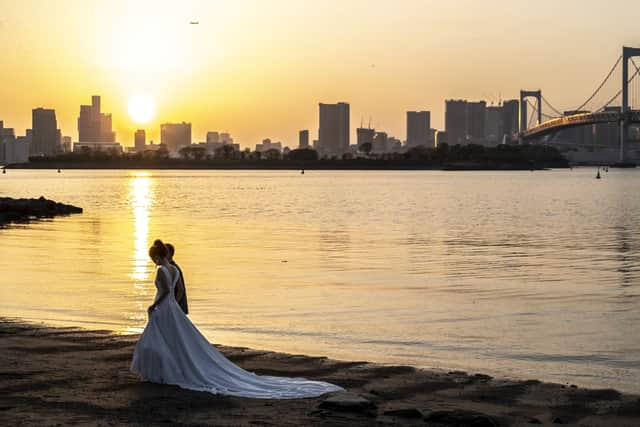What is a humanist wedding ceremony? Humanist UK beliefs explained and what does the UK law say?
and live on Freeview channel 276
There have been calls for existing wedding laws in England and Wales to be completely overhauled.
A government-commissioned report by the Law Commission, has said that the current rules are “stuck in time” and leave some couples having to pay for two ceremonies.
Advertisement
Hide AdAdvertisement
Hide AdThe newly proposed laws will let couples marry in “any safe and dignified location” and give legal recognition to humanist ceremonies.
But what is a humanist wedding? Here’s everything you need to know.
What is a humanist wedding?
A humanist wedding is a non-religious wedding ceremony that is personally tailored to the couple.


Advertisement
Hide AdAdvertisement
Hide AdUnlike a religious or civil ceremony, it can contain personalised vows, readings, music, poems or any traditions that the couple decide to incorporate such as handfasting or lighting a unity candle.
Couples will meet with their humanist celebrant prior to the ceremony, so that it can reflect them and their love story.
Humanist celebrants do however charge more than a civil or religious ceremony.
In Scotland the set price for a humanist wedding is £450.
What are humanist beliefs?
Humanists are non-religious, meaning they do not believe in an afterlife or a spiritual religion.
Advertisement
Hide AdAdvertisement
Hide AdThe focus of humanism is to focus on the life we lead now in an ethical way.
According to Humanists UK this is what defines someone as a humanist:
- trusts to the scientific method when it comes to understanding how the universe works and rejects the idea of the supernatural
- makes their ethical decisions based on reason, empathy, and a concern for human beings and other sentient animals
- believes that, in the absence of an afterlife and any discernible purpose to the universe, human beings can act to give their own lives meaning by seeking happiness in this life and helping others to do the same.
What does the UK law say about humanist weddings?
Humanist weddings are already legally recognised in Northern Ireland, Scotland, Ireland, Jersey and Guernsey.
However, in England, Wales or the Isle of Man, they are not legally recognised.
Advertisement
Hide AdAdvertisement
Hide AdYou can still have a humanist ceremony, but to make the marriage official you will also need to register the wedding separately at a registry office before or after your humanist ceremony.
The new proposed laws are hoping to change this, giving legal status to humanist weddings across the UK.
What would the changes mean?
The changes proposed by the Law Commission would mean weddings could take place at “any safe and dignified location.” This could include the beach, your garden or local park.
A set of universal rules would apply across religious and civil weddings, which would include legalising non-religious belief ceremonies, such as humanist weddings.
Advertisement
Hide AdAdvertisement
Hide AdProfessor Nick Hopkins, family law Commissioner at the Law Commission, said: “The current law on weddings is not working for many couples. Needless restrictions and outdated regulations mean that thousands each year are denied having a wedding that is meaningful to them.
“Our reforms for government are designed to protect the established practices and dignity of weddings, while offering couples more choice on where and how they marry. There is widespread precedent for our reforms around the world.
“By giving couples more control over their weddings and ensuring greater parity for all beliefs, the law can support those who want to get married, rather than putting unnecessary barriers in the way.”
Comment Guidelines
National World encourages reader discussion on our stories. User feedback, insights and back-and-forth exchanges add a rich layer of context to reporting. Please review our Community Guidelines before commenting.
